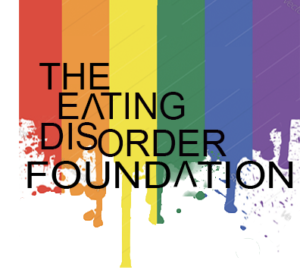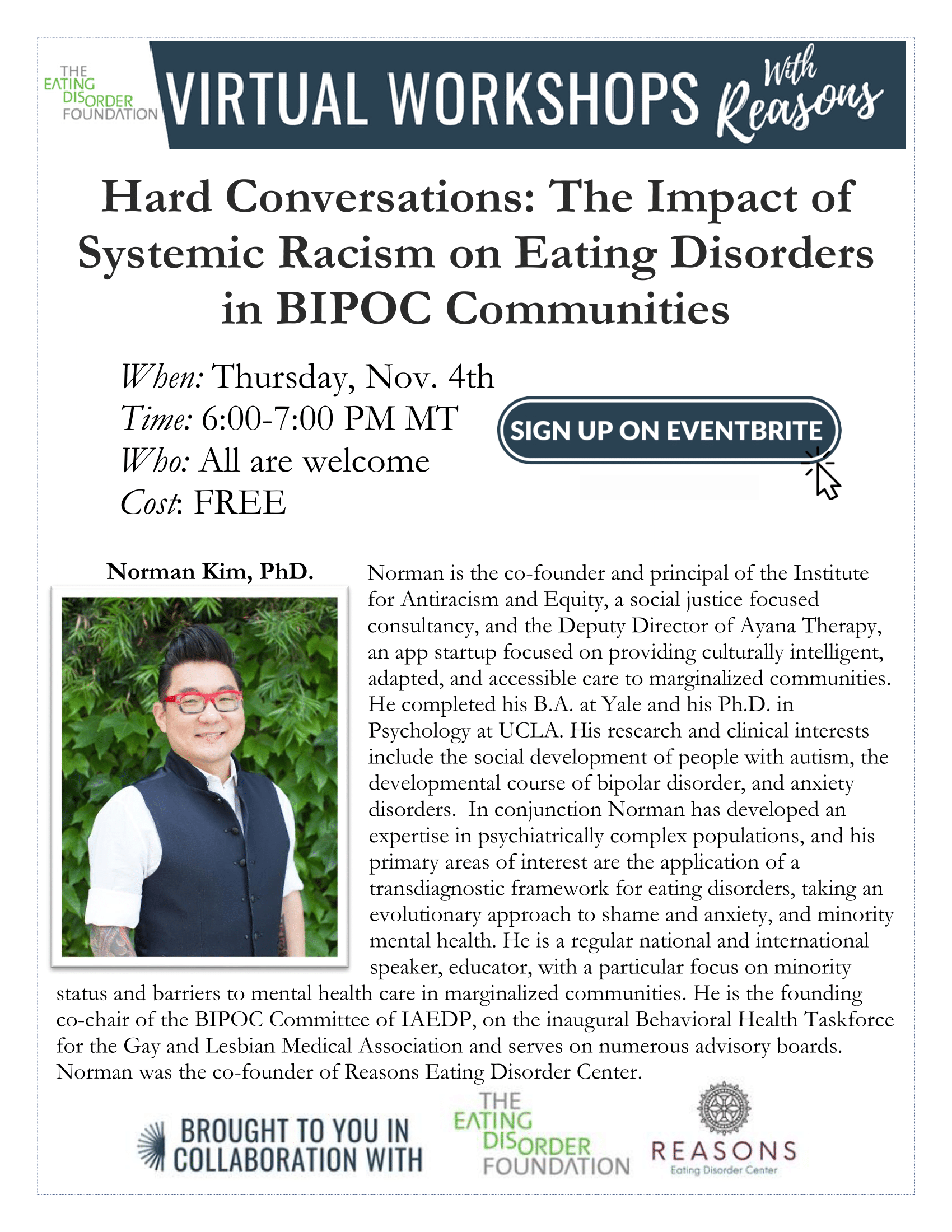This support group is ideal for family members and friends of individuals struggling or in recovery from an eating disorder. Join this group of parents, partners, siblings, and friends, and talk with someone who knows what you’re going through.
This group has been temporarily moved to a virtual format. Learn more
This support group is for lesbian, gay, bisexual, transgender, queer, and gender non-conforming individuals to discuss struggles with disordered eating, body image, and identity.
This group is virtual. Learn more
Every Thursday.
12:30-1:30 PM MST
Learn more here.
This group is virtual until further notice. Please register using the form here.
The Intersection of Discrimination and Shame in the Presentation of Eating Disorders in BIPOC Communities
Norman Kim, PhD. Norman is the co-founder and principal of the Institute for Antiracism and Equity, a social justice focused consultancy, and the Deputy Director of Ayana Therapy, an app startup focused on providing culturally intelligent, adapted, and accessible care to marginalized communities. He completed his B.A. at Yale and his Ph.D. in Psychology at UCLA. His research and clinical interests include the social development of people with autism, the developmental course of bipolar disorder, and anxiety disorders. In conjunction Norman has developed an expertise in psychiatrically complex populations, and his primary areas of interest are the application of a transdiagnostic framework for eating disorders, taking an evolutionary approach to shame and anxiety, and minority mental health. He is a regular national and international speaker, educator, and passionate advocate with a particular focus on minority status and barriers to mental health care in marginalized communities. He is the founding co-chair of the BIPOC Committee of IAEDP, on the inaugural Behavioral Health Taskforce for the Gay and Lesbian Medical Association, and serves on numerous advisory boards. Norman was the co-founder of Reasons Eating Disorder Center.
People from ethnic minority groups and those in LGBTQ+ communities suffer from eating disorders at similar or higher rates than in the general population. People from these communities must often also grapple with additional stigma and marginalization, resulting in a multiple dose of shame and reasons for experiencing self-hatred. Among other risk factors, a history of macro- and micro-aggressions, discrimination and marginalization, and the well-documented confluence of stressors associated with minority status puts people from these communities at particularly high risk for the development of disordered eating behaviors and their attendant consequences.
Despite the seriousness and lethal nature of eating disorders for all those affected, there remains a tremendous disparity in mental health services utilization among those from marginalized and minority groups. People from these groups are under-identified by professionals and tend to receive and utilize treatment for eating disorders at significantly lower rates. These disparities reflect a profound need for culturally competent assessment and treatment services for members of marginalized communities who are struggling with eating disorders.
Cultural competency among care providers is crucial in providing effective treatment in both medical and mental health settings, and has particular salience in the context of illnesses as complex and multifaceted as eating disorders. It is essential for therapists, dietitians, physicians, nurses, and other allied professionals to possess cultural knowledge and be able to apply such cultural understanding to assessment and delivery of interventions and therapies as a fundamental aspect of overall clinical competence.
Brought to you in collaboration with The Eating Disorder Foundation and Reasons Eating Disorder Center
For reminders about these events and others, sign up for our newsletter at the bottom of our home page https://www.eatingdisorderfoundation.org/
For questions about this event, contact us at 303-322-3373 or info@eatingdisorderfoundation.org
Bring any art supplies and “Create Your Story” through art journaling. It is your art and your time to express yourself through art in any way you choose. Hang out, listen to music, and make art in a relaxed, fun environment with your fellow EDF members. Must be at least 18 years old to attend.
This group takes place virtually. Learn more
Free virtual support group for people struggling with eating disorders, disordered eating, or body image. Must be 18 or older to participate.
Every Friday
12:30-1:30 PM MST
Learn more here.
This support group is for anyone 18+ struggling with binge eating disorder, compulsive eating, and negative body image. Diagnosis is not required.
Every Friday, 2:00-3:00 PM MST
Learn more here.
Fridays, 5:00 pm – 6:00 pm
Note: Group is every other week in June, July, and August. Weekly schedule will resume in September.
This group is for ages 13-17, addressing body image, self-worth, social media impact, self-care and more.
To register, a parent or guardian of the adolescent seeking support must contact us via phone or e-mail (303-322-3373 or info@eatingdisorderfoundation.org)
This support group is ideal for individuals 30 years and older that are struggling or in recovery from an eating disorder, disordered eating, or body image concerns.


